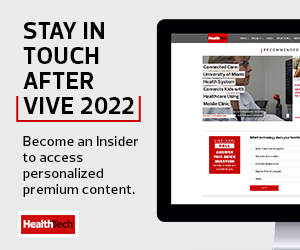The shift toward understanding healthcare in a more holistic, collaborative way has gained momentum in the U.S., especially over the course of the pandemic.
As researchers continue to study the health effects of long COVID-19, a growing number of U.S. adults are managing multiple chronic conditions, and an aging population will continue to test the limits of the nation’s healthcare system.
These concerns and others have thrust value-based care further into the spotlight. Instead of a focus on the quantity of care sustained by the traditional fee-for-service reimbursement model, value-based care focuses on the quality of care for patient-centered outcomes.
The U.S. Department of Health and Human Services had lofty goals in 2015 to gain wider adoption of quality-linked Medicare payments by 2018, but achievements were limited. Still, the desire to make value-based care a universal standard remains, and improved technology and increased interoperability are helping healthcare systems move closer to that goal.
Industry experts at ViVE, a new healthcare technology conference created by CHIME and HLTH, gathered on its opening day to discuss how technology can enable value-based care. ViVE takes place online and in person in Miami Beach, Fla., through March 9.
Click the banner below for access to exclusive HealthTech content and a customized experience.
Data Is Key to Value-Based Care Delivery
Healthcare organizations that can sift through massive amounts of data and still deliver critical insights to clinicians will lead the pack in the transition to value-based care.
“This new wave of value-based care is really about empowering physicians at the point of care to provide better care for the patient,” said Ben Quirk, chief strategy officer at the Miami-based, senior-focused healthcare network CareMax, during a panel on population health technology. Tech-enabled solutions should put as much data as possible at physicians’ fingertips in curated way to help them make the best clinical decisions, he said.
Moderator Julian Harris (far left), chairman and CEO of ConcertoCare, addresses panelists during the “Population Health Technology 2.0” session. From left to right: Springtide Child Development founder and CEO Jia Jia Ye, Cohere Health Founding Partner Siva Namasivayam, Curation Health founder and CEO Kevin Coloton, and CareMax Chief Strategy Officer Ben Quirk.
“Technology’s still incredibly fragmented in healthcare. Here in Florida, we’re lucky we have a really good state HIE,” Quirk said, referring to the state’s health information exchange. “Within 15 minutes of a patient walking into any emergency room across the state, we know about it. We can’t do that in New York, we can’t do that in Tennessee.”
He said it could be useful to shift from “data maximalism” to “data minimalism,” so that providers can act on the most high-quality data at low volume.
“To be able to be successful in a value-based care world, you’re consuming an incredible amount of information and having to take action on it,” Quirk added.
He also noted that collaboration and integration will be major components of the next generation of digital health solutions, as part of a continuum of care encompassing not just primary care but behavioral and specialty healthcare.
Incentives for Changing Healthcare Models
Finding financial alignment is the major ongoing challenge for value-based care. Partnering with health plans and risk-bearing providers have been strategies to move the needle.
“From the payer landscape, they realize that a lot of their higher cost conditions are managed by specialists, so payers have a real appetite for contracting with specialists in a value-based care manner,” Mike Edgeworth, chief population health officer at the platform developer Octave Bioscience, said during a session on the next generation of remote patient monitoring.
Lark Health CEO and co-founder Julia Hu (second from right) speaks during the “Digital Health as an Enabler of Value-Based Care” session. Gil Addo (far left), co-founder and CEO of RubiconMD; Christina Mainelli (second from left), COO of Quartet Health; and Crossover Health founder Nate Murray (far right) listen.
The challenge is that most specialists still follow the fee-for-service model, and they need a greater incentive to change.
But there’s promise for value-based care in specific areas, such as cardiovascular health. Dan Blumenthal, founder and CEO of care delivery platform Novocardia, said that payers and risk-bearing primary care groups are particularly interested in cardiovascular disease management because of the availability of existing interventions that work in rigorous and standardized ways.
The “Next-Generation RPM and Diagnostics as Enablers of Value-Based Care” session was led by moderator Dr. Creagh Milford (far left), head of enterprise virtual care at CVS Health. From second from left to right, the panelists are Mike Edgeworth, chief population health officer at Octave Bioscience; Ramin Mousavi, president and CEO of Cathworks; Eric Schadt, founder and CEO of Sema4; and Dan Blumenthal, CEO of Novocardia.
Keep this page bookmarked for our ongoing virtual coverage of ViVE 2022. Follow us on Twitter at @HealthTechMag and join the conversation at #ViVE2022.














